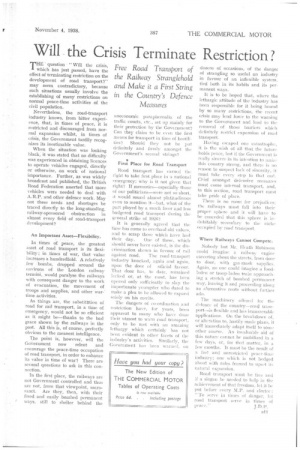Will the Crisis Terminate Restriction?
Page 45

If you've noticed an error in this article please click here to report it so we can fix it.
Free Road Transport of the Railway Stranglehold and Make it a First String in the Country's Defence
Measures
T". question " Will the crisis, which has just passed, have the effect of terminating restriction on the development of road transport?" may seem contradictory, because such situations usually involve the establishing of many restrictions on normal peace-time activities of the civil population.
Nevertheless, the road-transport industry knows, from bitter experience, that, in times of peace, it is restricted and discouraged from normal expansion whilst, in times of crisis, the Government tardily recognizes its inestimable value.
When the situation was looking black, it was stated that no difficulty was experienced in obtaining licences to operate vehicles engaged, directly or otherwise, on work of national importance. Further, as was widely broadcast and published, the British Road Federation asserted that more vehicles were needed to deal with A.R.P. and other defence work. May not these needs and shortages be traced directly to the long-standing, railway-sponsored obstruction in almost every field of road-transport development?
An Important Asset—Flexibility.
Intimes of peace, the greatest asset of road transport is its flexibility; in times of war, that value increases a hundredfold. A relatively few bombs, dropped around the environs of the London railway termini, .would paralyse the railways with consequent danger to the work of evacuation, the movement of troops and supplies, and other wartime activities.
As things are, the sulastittrtion of road for rail transport, in a time of emergency, would not be so efficient as it might he—thanks to the bad grace shown by the railways in the past. All this is, of course, perfectly obvious to the meanest intelligence.
The point is, however, will the Government now relent and encourage the peace-time occupation of road transport, in order to enhance its value in time of war? There are several questions to ask in this connection.
In the first place, the railways are not Government controlled and thus are not, from that viewpoint, sacrosanct. Are they, then, with their fixed and easily bombed permanent ways, still to shelter behind the
uneconomic paraphernalia of the traffic courts, etc., set no mainly for their protection by the Government? Can they claim to be even the first means for transport in tirne of hostilities? Should they not be put definitely and firmly amongst the Government's second strings?
First Place for Road Transport
Road transport has earned the right to take first place in a national emergency; why is it not given that right? If memories—especially those of our politicians—were not so short, it would sound almost platitudinous even to mention it—but, what of the part played by a much freer and less badgered road transport during the general strike of 19211?
It is generally agreed that the. time has come to overhaul old values, and to scrap those which have had their day. One of these, which should never have existed, is the discrimination shown in favour of rail against road. The ad -transport industry knocked, again and again, -upon the door of official favour. That door has, to date, remained locked or, at the most, has been opened only sufficiently to slap the importunate youngster who dared to make a plea to be allowed to expand solely on his merits.
The dangers of co-ordination and restriction have, for years, been apparent to many who have done their utmost to warn road transport, only to be met with an amazing lethargy which certainly has not been evident in other facets of the industry's activities. Similarly, the Government has been warned, on dozens of occasions, of the danger of strangling so useful an industry in favour of an inflexible system, tied both in its habits and its permanent ways.
It is to be hoped that, where the lethargic attitude of the industry has been responsible for it being bound by so many restrictions, the recent crisis may lend force to the warning to the Government and lead to the removal of those barriers which definitely restrict expansion of road transport.
Having escaped one catastrophe, it is the wish of all that the future holds peace, but if the Government is really sincere in its intention to make this country strong, and there is no reason to suspect lack of sincerity, it must take every step to that end. Chief amongst defensive rn.easures must come internal transport, and, in this section, road transport must take pride of place.
There is no room for prejudices; the railways must fall into their proper sphere and it vill have to be conceded that this sphere is indubitably secondary to the niche occupied by road transport.
Where Railways Cannot Compete.
Nobody but Mr. Heath Robinson could imagine a railway engine careering about the streets, from door to door, with gas-mask supplies. Again, no one could imagine a foodladen or troop-laden train approaching a stretch of bombed permanent way, leaving it and proceeding along an alternative route without further ado.
The machinery offered for the clefence of the country—road transport—is flexible and has innumerable applications. On the breakdown of, or alteration to, hastily made plans, it will immediately adapt itself to some other course. An invaluable aid of this nature cannot be mobilized in a few days, or, for that matter, in a few months. It must be the result of a free., and unrestricted peace-time industry; one which is not hedged about with rules framed to upset its natural expansion.
Road transport must be free and if a slogan he needed to help ill the achievement of that freedom, let it be put before every M.P. and elector: " To serve in times of danger, let road transport serve in times of pt'ace. J.D.P.




















































































